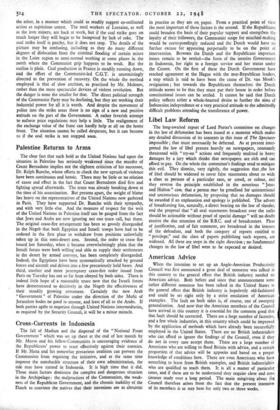Libel Law Reform
The long-awaited report of Lord Porter's committee on changes in the law of defamation has been issued at a moment which makes any detailed discussion of its contents in this issue of The Spectator impossible ; that must necessarily be deferred. As at present inter- preted the law of libel presses heavily on newspapers, constantly threatened with " try-on " actions and frequently mulcted in heavy damages by a jury which thinks that newspapers are rich and can afford to pay. On the whole the committee's findings tend to mitigate this evil. They dismiss, very rightly, the suggestion that the law of libel should be widened to cover false statements about so wide a class as persons of a particular race, or creed, or colour, and they reverse the principle established in the notorious " Jones and Hulton " case that a person mar be penalised for unintentional and unconscious defamation, by proposing that no damages should be awarded if an explanation and apology is published. The advent of broadcasting has, naturally, a direct bearing on the law of slander, and the proposal that " all oral statements broadcast over the radio should be actionable without proof of special damage " will no doubt receive the due attention of the B.B.C. and of broadcasters. Pleas of justification, and of fair comment, are broadened in the interest of the defendant, and both the category of reports entitled to " privilege," and the class of papers publishing such reports, are widened. All these are steps in the right direction ; no fundamental changes in the law of libel were to be expected or desired.


































 Previous page
Previous page